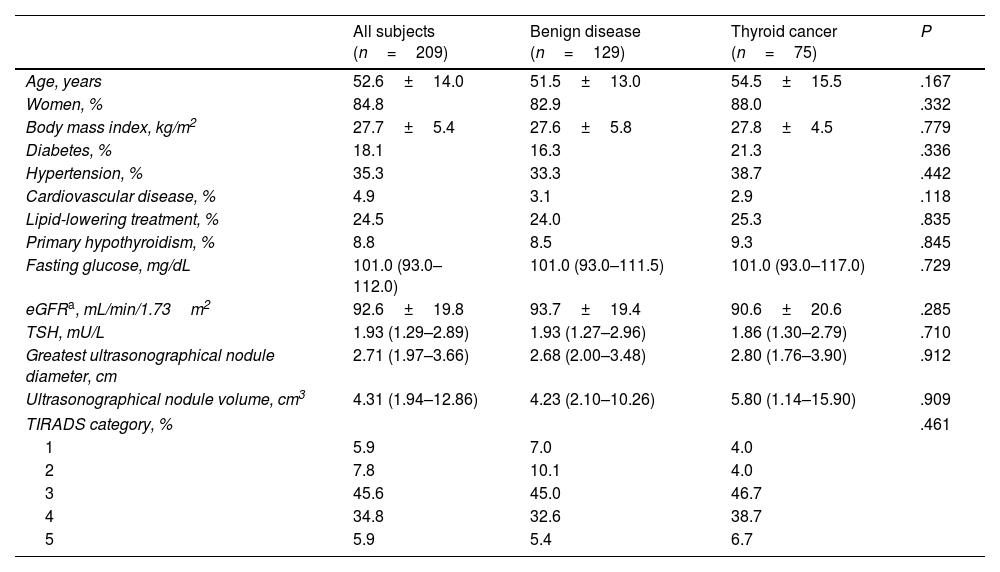Some epidemiological data suggest that there may be an inverse relationship between cholesterol levels and the risk of thyroid cancer in the overall population. The present study was aimed to evaluate the lipid profile specifically in subjects with Bethesda category IV thyroid nodules, and compare whether there were any differences between those with benign and malignant nodules.
MethodsSingle-centre, retrospective study on 204 subjects treated by partial or total thyroidectomy for excision of a Bethesda category IV thyroid nodule, who had undergone a blood lipid profile test in the 12 months prior to surgery. In addition to lipid measures, other demographic, clinical, biochemical and ultrasound data were collected.
ResultsSeventy-five subjects (36.8%) were diagnosed with thyroid carcinoma in the definitive histopathological examination. Patients with thyroid cancer had lower levels of total cholesterol, LDL-cholesterol and non-HDL-cholesterol than subjects with benign thyroid diseases. There were no differences in HDL-cholesterol, triglycerides or total cholesterol/HDL-cholesterol ratio. There were no differences either between groups in other clinical, biochemical and ultrasound variables, including the use of lipid-lowering drugs. In multivariate analysis, only LDL-cholesterol was independently associated with malignancy. Subjects with follicular carcinoma showed the lowest cholesterol levels, while those with papillary carcinoma had intermediate values between the group with follicular carcinoma and the group with benign thyroid diseases.
ConclusionsIn subjects with cytologically indeterminate Bethesda category IV thyroid nodules, levels of total cholesterol, non-HDL-cholesterol and, particularly, LDL-cholesterol are lower among those with malignant nodules.
Algunos datos epidemiológicos sugieren que, a nivel de la población general, puede existir una relación inversa entre los niveles de colesterol y el riesgo de cáncer de tiroides. El presente estudio tuvo como objetivo evaluar el perfil lipídico específicamente en sujetos con nódulos tiroideos categoría Bethesda IV, y comparar si existían diferencias entre aquellos con nódulos benignos y malignos.
MétodosEstudio retrospectivo unicéntrico en 204 sujetos tratados mediante tiroidectomía parcial o total para exéresis de un nódulo tiroideo categoría Bethesda IV, a los que se había realizado un análisis del perfil lipídico sanguíneo en los 12 meses previos a la cirugía. Además de las medidas lipídicas, se recogieron otros datos demográficos, clínicos, bioquímicos y ecográficos.
ResultadosSetenta y cinco sujetos (36,8%) fueron diagnosticados de carcinoma tiroideo en el estudio histopatológico definitivo. Los pacientes con cáncer de tiroides tenían niveles más bajos de colesterol total, colesterol-LDL y colesterol no-HDL que los sujetos con enfermedades tiroideas benignas. No hubo diferencias en el colesterol HDL, los triglicéridos o la relación colesterol total/colesterol HDL. Tampoco hubo diferencias entre los grupos en otras variables clínicas, bioquímicas ni ecográficas, incluido el uso de fármacos hipolipemiantes. En el análisis multivariante, solo el colesterol LDL se asoció de forma independiente con la malignidad. Los sujetos con carcinoma folicular mostraron los niveles de colesterol más bajos, mientras que los que presentaban carcinoma papilar tenían valores intermedios entre el grupo con carcinoma folicular y el grupo con enfermedades tiroideas benignas.
ConclusionesEn sujetos con nódulos tiroideos citológicamente indeterminados de categoría Bethesda IV, los niveles de colesterol total, colesterol no-HDL y, particularmente, colesterol-LDL son más bajos entre aquellos con nódulos malignos.








